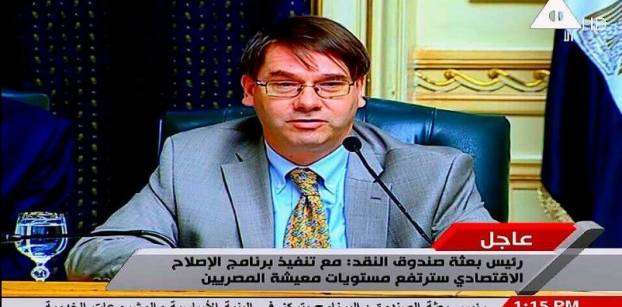Egypt cabinet holds press conference as IMF agrees $12 billion funding deal

IMF's chief of mission to Egypt Chris Jarvis during a press conference on Aug. 11, 2016 - photo from state television
CAIRO, Aug 11 (Aswat Masriya) - As the International Monetary Fund announced its approval of a $12 billion three-year loan programme, Egypt's cabinet and central bank governor held a press conference on Thursday.
The IMF said on Thursday it had reached a staff-level agreement with Egypt for a $12 billion three-year funding facility to support a government reform programme.
The deal is subject to the approval of the IMF executive committee which is expected to consider the request in the coming weeks.
An IMF mission headed by Chris Jarvis began its visit to Egypt on Jul. 30 to complete negotiations over the loan programme and discuss policies that can help Egypt meet its economic challenges.
Speaking at the press conference, Jarvis said that Egypt is a strong country with great potential, but has some problems that need to be fixed "urgently".
"The government recognizes the need for quick implementation of economic reforms for Egypt to restore macroeconomic stability and to support strong, sustainable and job-rich growth," Jarvis stated according to an IMF press release on Thursday.
According to Jarvis, key points of concern for the IMF are the budget deficit, the level of public debt and the functioning of the foreign exchange market.
The aim is to bring down the budget deficit and also devise a foreign exchange policy that ends the hard currency shortages.
"Over the program period general government debt is expected to decline from about 98% in 2015/16 to about 88% of GDP in 2018/19," Jarvis said.
"Moving to a flexible exchange rate regime will strengthen competitiveness, support exports and tourism and attract foreign direct investment," Jarvis added.
Central bank Governor Tarek Amer said that the agreement with the IMF gives credibility to Egypt's economic programme.
Egypt's parliament had approved in April the government's economic reform progamme that runs for three years. The programme includes raising revenues and reducing spending to bring down the budget deficit.
Egypt's Minister of Finance Amr al-Garhy said that a social safety net was in place in response to an inquiry by one of the reports regarding the effect of the reforms on the low-income segment of society.
Garhy further stated that subsidies have been misallocated for the past 15 years, but affirmed the government's commitment to subsidising goods with the right targets.
Egypt is seeking to push ahead with reforms, including VAT and cuts to electricity and petroleum subsidies that were begun in 2014 but put on hold when global oil prices dropped.
The CBE devalued the pound by about 14 per cent to reach EGP 8.78 against the dollar in March in an effort to close the gap between the official and parallel rate. It has also led a crackdown on foreign exchange bureaus for the same purpose.
The economy has been struggling since a mass uprising in 2011 ushered in political instability that drove away tourists and foreign investors, both major earners of foreign currency. The turmoil has seen foreign reserves more than halve from some $36 billion before the uprising to $15.536 billion in July.









facebook comments